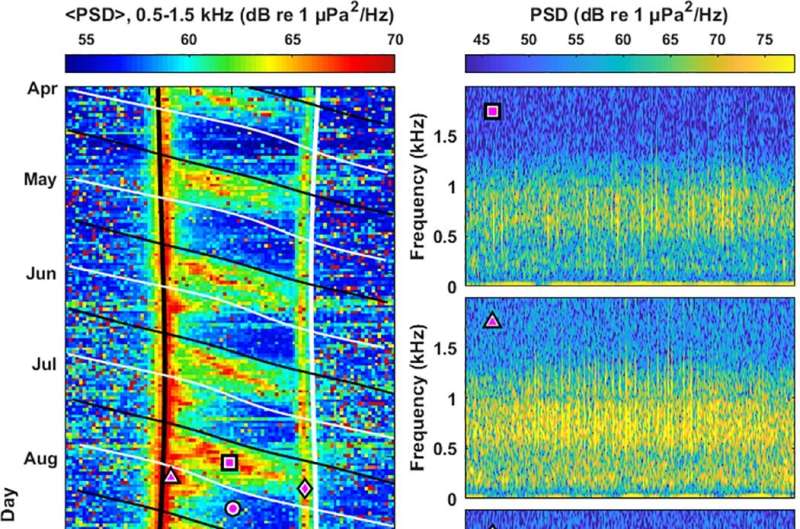March 27, 2024 report
This article has been reviewed according to Science X's editorial process and policies. Editors have highlighted the following attributes while ensuring the content's credibility:
fact-checked
peer-reviewed publication
trusted source
proofread
Sounds emanating from coral reefs found to change as the moon rises and sets

A pair of underwater researchers at the U.S. Navy's Naval Undersea Warfare Center, working with a colleague from the Advanced Research Projects Agency–Energy, also in the U.S., has found that sounds emanating from coral reefs change as the moon rises and sets.
In their study, published in PLOS ONE, the group used underwater microphones to listen to sounds coming from coral reefs over the year 2020 to 2021.
Prior research has shown that the health of a coral reef can be measured by listening to sounds generated by fish and other organisms that live on and around such reefs—more noise means more creatures, which is generally believed to represent the overall health of a reef.
For this new study, the research team explored changes to reef noise levels when the moon rises and sets. Noise levels vary between night and day due to the amount of light shining through the water—the moon reflects a lot of light; thus, the team thought its presence in the sky might also have an impact on coral organism activity and the resulting amount of noise.
To find out if the moon might have an impact on coral reef noise levels, the group lowered sonic monitoring devices into the vicinity of coral reefs off the coast of Hawaii on multiple occasions, each time capturing one minute of noise over 10-minute intervals
The researchers found that there were differences in noise levels. As the moon rose, reflecting more light onto the sea, high-frequency pulses of sound increased while low-frequency sound pulses decreased. The reverse happened after the moon set. Such changes in sound, the researchers note, indicate that light reflected from the moon has a direct impact on activity levels in coral reefs.
Such information is valuable, as rising global temperatures and increases in ocean acidification pose threats to coral reefs and the sea life they support. Knowing when they are most active could assist with efforts to save them.
More information: Daniel Duane et al, Moonlight-driven biological choruses in Hawaiian coral reefs, PLOS ONE (2024). DOI: 10.1371/journal.pone.0299916
Journal information: PLoS ONE
© 2024 Science X Network




















